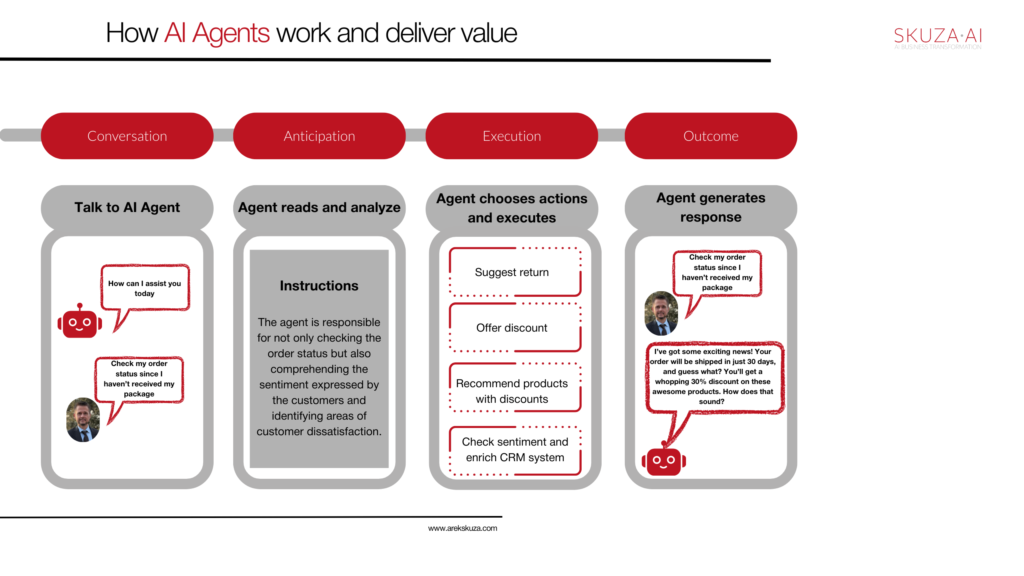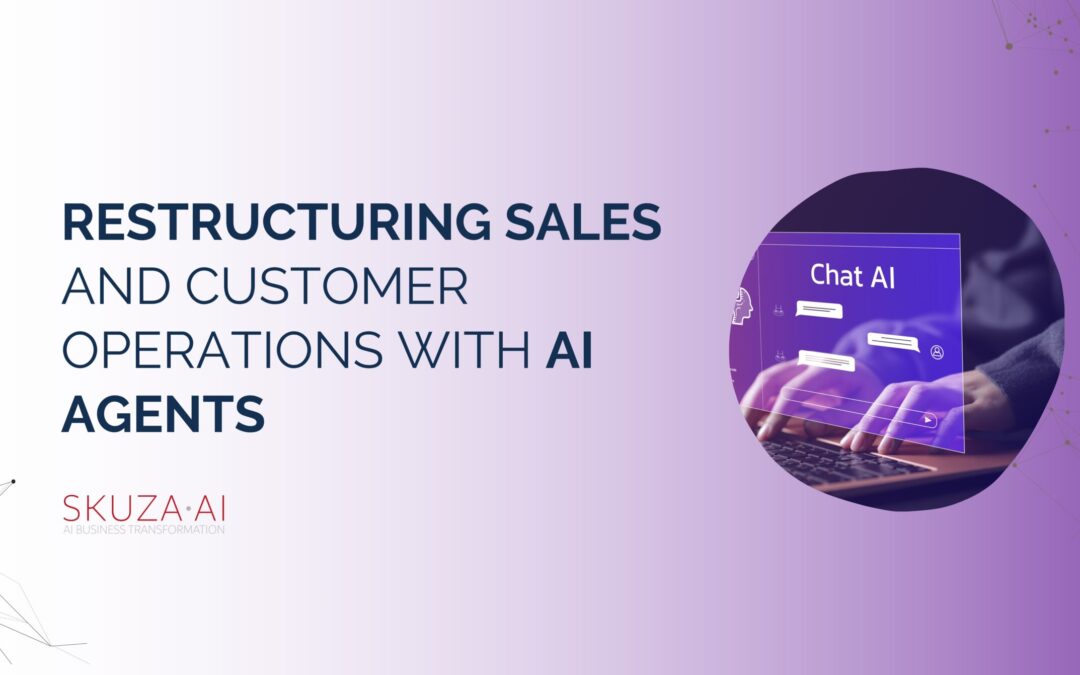Senior executives are increasingly recognizing the transformative potential of Artificial Intelligence to reshape business operations. This article examines the implications of Artificial Intelligence agents for enhancing efficiency, productivity, and overall business value. I want to explore the capabilities of AI agents, large language models (LLMs), and the strategic advantages they offer across various departments, including sales operations, customer operations, and beyond.
Beyond Simple Bots: The Rise of Autonomous AI Agents
For years, businesses have utilized chatbots and copilot tools to automate simple tasks and improve customer experiences. However, these solutions often fall short in addressing complex scenarios, requiring extensive programming and lacking the ability to reason and act autonomously. Agent transcends these limitations by leveraging advanced artificial intelligence agents powered by LLMs. Unlike rule-based bots, these agents exhibit the ability to reason, plan, and engage in more natural, relatable conversations, thus improving customer satisfaction and agent productivity. This shift from reactive, ask-and-response copilot models to proactive, autonomous agents represents a significant leap forward in AI capabilities.
The conversation revealed that a significant portion – 40% – of daily agent time is dedicated to low-value, repetitive tasks. This inefficient allocation of resources directly impedes growth and scaling. agent directly addresses this challenge by automating these mundane tasks, freeing up human agents to focus on higher-value activities, thereby dramatically boosting sales productivity and overall efficiency.

Image: How AI Agents work and deliver value, Source: SkuzaAI Internal Research
AI agents are revolutionizing customer service by delivering value through every step of the customer journey. As illustrated in this graphic, an AI agent can listen to a customer’s request, analyze their sentiment and then proactively choose a relevant response. Instead of a simple check-in on an order status, the AI agent can use the opportunity to suggest a return, offer a discount or recommend products with a discount. This approach leverages the AI agent to not only solve customer issues but also drive revenue and build brand loyalty. This proactive and personalized approach to customer service is a game-changer for B2B companies operating on complex markets with complex offering. AI agents are capable of understanding the nuances of human interaction, recognizing patterns in customer behavior, and identifying opportunities to enhance the customer experience. By embracing AI agents, executives can unlock a powerful new dimension in customer service, transforming their operations into revenue-generating centers.
Artificial intelligence offers numerous opportunities to improve the agent experience.
- AI-powered speech recognition and text analysis tools can automate transcription and extract key information from calls and notes, reducing tedious data entry.
- Generative AI can quickly provide agents with relevant information from various sources like articles, FAQs, and training materials, making knowledge more accessible.
- AI can route complex issues to the best-suited agent, providing them with necessary background information, automating agent assistance.
- AI analyzes agent interactions, offering real-time guidance and identifying areas for improvement, effectively coaching agents with personalized feedback.
- AI can optimize scheduling based on call volume and staffing needs, automatically adjusting to changes and notifying agents of schedule alterations, automating scheduling and staffing.
- AI can handle complex tasks, freeing up agents to focus on building customer relationships and creating a positive customer experience, augmenting human capabilities.
- Gathering ongoing feedback from agents is crucial for refining AI tools and addressing any friction points, ensuring AI listens to agents and continuously improves.
Out-of-the-Box Agents and Customizable Solutions
Agent offers a suite of pre-built agents designed for immediate deployment across various business functions. These out-of-the-box agents, including sales agents, service agents, marketing agents, and commerce agents, provide a quick and efficient way for organizations to begin leveraging the power of AI.
The sales agent, for example, can qualify leads, engage prospects, and even schedule meetings for account executives, transforming a lengthy process into a streamlined, efficient one. The service agent can handle a substantial volume of tier-one customer inquiries 24/7, ensuring prompt and consistent support, particularly crucial during peak periods like the holiday season. The marketing agent aids in campaign design and customer journey mapping, optimizing marketing efforts and boosting ROI. The commerce agent facilitates website personalization and promotional activities, enhancing customer engagement and driving sales.
Crucially, these out-of-the-box agents are built on a highly flexible platform, allowing for extensive customization to meet specific industry needs and business requirements. Businesses in healthcare, retail, manufacturing, finance, and other sectors can tailor these agents to their unique workflows and processes, maximizing their impact.
Incidentally, if your team is interested in learning about AI Agents and other strategies for rebuilding your customer operations, please visit my Enterprise Trainings Programs.
The Critical Role of Data and the Atlas Reasoning Engine
The effectiveness of AI agents hinges on the quality and relevance of the data they utilize. Agent leverages data usually stored in a cloud, encompassing both structured and unstructured data, to provide AI agents with comprehensive, accurate information. The reasoning engine is central to this process, processing this data to generate insightful predictions and drive appropriate actions. Field tests have shown that agent’s data processing techniques deliver over twice the relevance and a third more accuracy than other solutions, highlighting the platform’s superior performance.
The seamless integration of data and actions is a cornerstone of agent. The platform needs to allow businesses to expose actions, flows, and APIs to the reasoning engine, enabling AI agents to interact with other systems and complete tasks autonomously. However, this autonomy requires robust guardrails and policy implementations to ensure the agent’s actions align with established business rules and ethical guidelines. This emphasis on responsible AI development underscores agent’s commitment to reliability and trust. Please review my project for a B2B company that employs analogous techniques for the design of chatbots.
Building and Authoring Agents: A No-Code/Low-Code Approach
Agent’s design prioritizes accessibility. The solution should employ a natural language interface for building and modifying agents, significantly lowering the barrier to entry for non-technical users. This no-code/low-code approach empowers agents creators, to create, customize, and deploy AI agents with minimal coding knowledge. The process involves defining “topics,” outlining the tasks the agent should perform, and providing natural language instructions on how to execute those tasks. This intuitive approach enables businesses to rapidly develop and iterate on AI agents, tailoring them to evolving business needs. Many organizations consider building their own AI solutions. However, this approach often proves costly and inefficient including ongoing model training, costly data storage, and the need for continuous adaptation to changing business environments and technological advancements. Public data sources often fail to address specific business questions, forcing companies into the costly and time-consuming process of building custom models.
Agent eliminates this need and companies like Salesforce or Beam provides of the shelf solutions. The no-code/low-code approach enables businesses to rapidly implement and customize AI agents, leveraging existing data and workflows. This reduces the need for specialized AI developers and frees up IT resources, making AI adoption more accessible and cost-effective.
Example of industrial company which brings AI Agents to customer operations.
The manufacturing industry thrives on efficiency and accuracy, especially when it comes to order processing. For a leading German manufacturer, this meant grappling with the manual handling of countless order updates arriving in various formats: emails, PDFs, and spreadsheets. Each update demanded meticulous data extraction and entry into their ERP system, a repetitive, time-consuming process that strained resources, delayed order fulfillment, and left room for human error. In this case intelligent assistants were designed to seamlessly integrate into the company’s existing ERP system and order processing workflow. Operating with the same standard procedures as human employees, they ensured a smooth transition and immediate value delivery. The workflow comprised three primary steps: receiving and identifying incoming order update documents, extracting relevant order data (e.g., product codes, quantities, delivery addresses), and updating the ERP system with this information. The most complex step was data extraction due to the variety of document formats and layouts. Beam prioritized automating high-volume document types, achieving a significant portion of automation early on.
The results were remarkable:
- 96% of order updates were automated, processing over 300 updates per week with unprecedented speed and accuracy. This freed up employees to focus on higher-value tasks.
- Manual processing time was reduced by 89%, accelerating order fulfillment and enhancing responsiveness to customer demands.
- Manual errors decreased by 23%, ensuring more accurate order processing and improving customer satisfaction.
This AI-powered solution has revolutionized order processing for mentioned German manufacturer. By automating repetitive tasks, boosting efficiency, and minimizing errors, the solution enables manufacturers to streamline operations, reduce costs, and elevate customer experiences.
Example of technology company
Telstra, Australia’s leading telecommunications company, faces the challenge of providing rapid and accurate customer service across a vast network. To address this, they partnered with Microsoft Azure OpenAI service to develop “Ask Telstra,” a powerful AI tool that empowers customer service agents. This AI solution taps into a massive database of information, summarizing a customer’s history and providing concise answers to product, service, and technical inquiries in mere seconds. This quick access to information significantly speeds up customer interactions, enabling agents to resolve issues efficiently and provide a seamless experience. Ask Telstra not only streamlines customer service but also facilitates rapid onboarding for new agents, equipping them with the knowledge to handle customer queries effectively. As Lisa Green, data and AI solutions executive at Telstra, notes, “Agents are happy that they’re confident in their ability to support our customers more effectively.” This confidence translates into tangible results: a 20% reduction in follow-up calls, 84% of agents reporting a positive impact on customer interactions, and a 90% increase in agent effectiveness. Ask Telstra is a testament to the power of AI in revolutionizing customer service, enabling Telstra to provide exceptional experiences to its diverse customer base.
Conclusion
In an era where businesses are striving for greater efficiency, agility, and customer satisfaction, AI agents are emerging as a transformative force. This blog post has explored the power of AI agents, highlighting their capabilities to transcend the limitations of traditional chatbots and copilot tools. By leveraging advanced LLMs and a robust reasoning engine, these agents can analyze data, make intelligent decisions, and execute tasks autonomously, freeing up human resources for more strategic endeavors.
From streamlining order processing in manufacturing to enhancing customer service in telecommunications, real-world examples showcase the tangible benefits of AI agent implementation. Businesses across various industries can leverage agent’s out-of-the-box solutions, tailor them to specific needs, and achieve significant improvements in efficiency, productivity, and customer experience.
If you are an executive seeking guidance on how AI Agents can enhance your business operations, I recommend subscribing to my coaching exercise.

